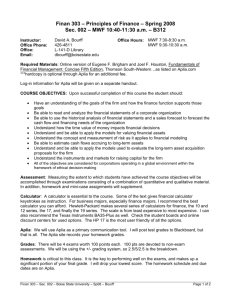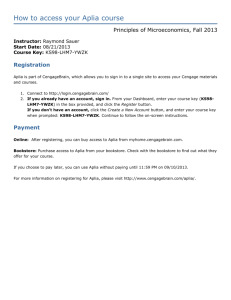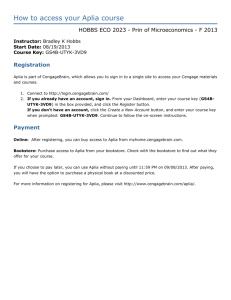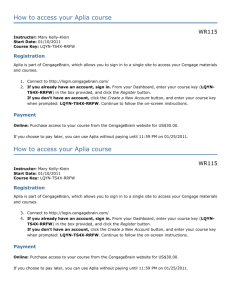Course Syllabus - College of Charleston
advertisement
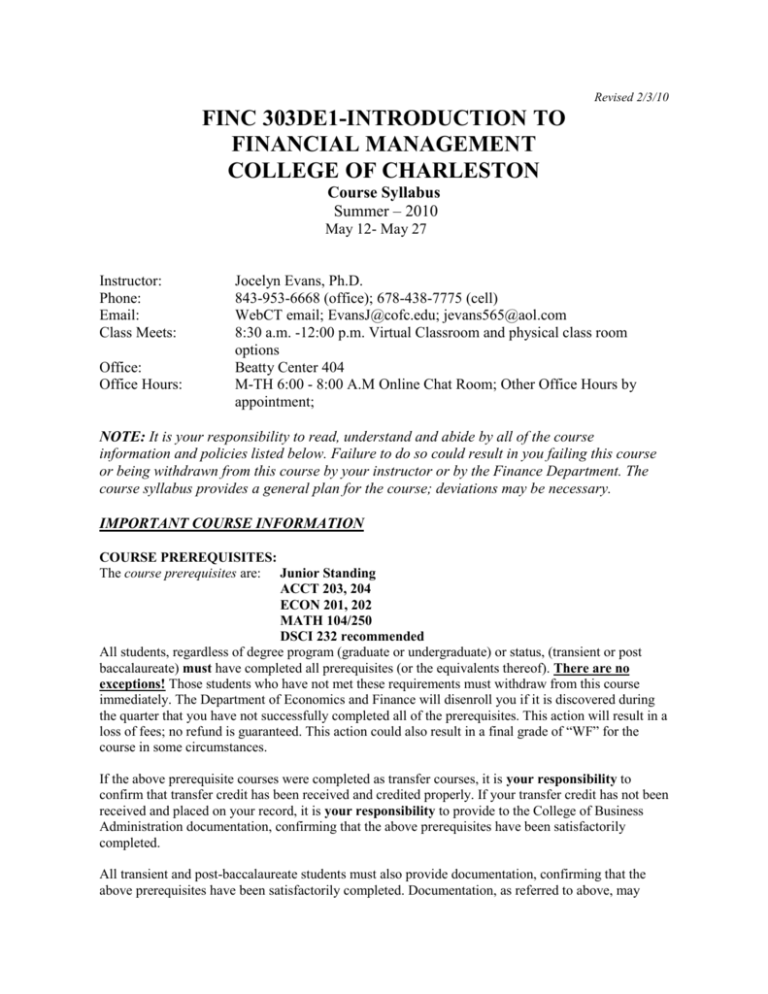
Revised 2/3/10 FINC 303DE1-INTRODUCTION TO FINANCIAL MANAGEMENT COLLEGE OF CHARLESTON Course Syllabus Summer – 2010 May 12- May 27 Instructor: Phone: Email: Class Meets: Office: Office Hours: Jocelyn Evans, Ph.D. 843-953-6668 (office); 678-438-7775 (cell) WebCT email; EvansJ@cofc.edu; jevans565@aol.com 8:30 a.m. -12:00 p.m. Virtual Classroom and physical class room options Beatty Center 404 M-TH 6:00 - 8:00 A.M Online Chat Room; Other Office Hours by appointment; NOTE: It is your responsibility to read, understand and abide by all of the course information and policies listed below. Failure to do so could result in you failing this course or being withdrawn from this course by your instructor or by the Finance Department. The course syllabus provides a general plan for the course; deviations may be necessary. IMPORTANT COURSE INFORMATION COURSE PREREQUISITES: The course prerequisites are: Junior Standing ACCT 203, 204 ECON 201, 202 MATH 104/250 DSCI 232 recommended All students, regardless of degree program (graduate or undergraduate) or status, (transient or post baccalaureate) must have completed all prerequisites (or the equivalents thereof). There are no exceptions! Those students who have not met these requirements must withdraw from this course immediately. The Department of Economics and Finance will disenroll you if it is discovered during the quarter that you have not successfully completed all of the prerequisites. This action will result in a loss of fees; no refund is guaranteed. This action could also result in a final grade of “WF” for the course in some circumstances. If the above prerequisite courses were completed as transfer courses, it is your responsibility to confirm that transfer credit has been received and credited properly. If your transfer credit has not been received and placed on your record, it is your responsibility to provide to the College of Business Administration documentation, confirming that the above prerequisites have been satisfactorily completed. All transient and post-baccalaureate students must also provide documentation, confirming that the above prerequisites have been satisfactorily completed. Documentation, as referred to above, may consist of a copy of a grade report or a copy of an unofficial transcript. Documentation received after the aforementioned date will not be accepted and those students who have been withdrawn for prerequisite violation will not be reinstated in the class. REQUIRED TEXT: Essential of Corporate Finance by Ross, Westerfield and Jordan, Irwin. Aplia Homework Website Study Guide to the required text is recommended. Regular reading of the Wall Street Journal is required (sign up sheet) http://wsj.com/student The use of a financial calculator and proficiency in the use if spreadsheets (e.g. Lotus 123, Microsoft Excel) are essential. CALCULATOR: It is necessary that you have a financial calculator to use throughout the course. Have your calculator each day!!! Many Textbook problems require complex arithmetic operations, and a financial calculator is necessary to solve these problems efficiently. This is especially true for exams. I recommend that you use the Texas Instruments BA II Plus. IMPORTANT RULES, GUIDELINES AND OTHER INFORMATION NOTE: I apologize in advance for the official/legal tone of the rules and guidelines that follow. I do not wish to be impersonal, demeaning or harsh. These policies have evolved over many years and hopefully cover any and all questions that may arise concerning the administration of the class. COURSE OBJECTIVE: FINC 303 is an introductory to financial management of non-financial corporations. It emphasizes financial statement analysis, financial forecasting, time value of money, valuation of various classes of securities, and the estimation and analysis of cash flows in the capital budgeting process. COURSE LEARNING OBJECTIVES: 1. The overall learning objective in this course is for you to develop a framework for financial analysis that will enable you make sound career and personal financial decisions, and prepare you further studies in business. 2. Theoretical/Analytical knowledge will be developed in the areas of: a. Working capital management b. Value of the firm’s assets c. Risk and return d. Financial leverage and the cost of capital e. Capital budgeting f. Dividend policy g. International finance 3. Practical competencies will be developed in: a. Financial statement analysis techniques b. Time value of money calculations c. Capital budgeting analysis techniques d. Financial planning/forecasting techniques e. Stock and bond valuation techniques f. Cost of capital calculations STUDENT RESPONSIBILITY: Textbook chapters to read before the day that topic is covered in class, are listed in the course outline. Be sure to refer to the outline that corresponds to the class days for the course you attend. The Textbook has been designed as a self-directed learning guide. It is the responsibility of each student to know and understand the subject matter covered in each Textbook chapter whether or not the specific material is covered in class. Additionally, each student is responsible to know how to solve, before each scheduled exam, all of the assignments and problems listed in the course outline for all of the chapters covered in that exam. COURSE FORMAT AND ATTENDANCE: This course is a blended format that incorporates distance-learning that primarily utilizes virtual classroom and interaction with in class exams. Students are expected to take an active approach to learning and to exhibit proper responsibilities and self discipline. Please observe deadlines for various assignments. If you choose to take this course as a distance-learning class all correspondence will be managed through WebCT. It is the students’ responsibility to check WebCT email and the discussion forum on a regular basis. All materials for the course (except the textbook and Aplia) will be posted on WebCT. It is the student’s responsibility to study the chapters in accordance with the reading schedule. Please note that the student has the option to come to class for a standard lecture. Regardless of the decision to view the lecture online or in class, each student is expected to attend ALL scheduled class meetings for the entire duration of the class meeting. *Attendance is expected for the first class on May ??, 2010 for introduction and instructions. *All Aplia assignment due dates are listed on the website. *Students have the option of viewing the lectures on the CofC QT Movies on Stream. *All PowerPoint outlines are on WebCT in addition to other supporting materials. *Students may ask questions by posting on the WebCT Discussion board or chatting with me during online office hours. Please anticipate a reasonable time for me to respond to your questions during non-office hours. Questions posted after 6:00 PM will not be answered until the next day. An absence from class for any reason (job conflict, illness, appearance in court, transportation problems, travel, athletic event, etc.), even if permitted and/or excused by your instructor, will count as one of the class absences against the three-week equivalent cumulative limit specified above. If a student is withdrawn for excessive absences, a final grade of WF will be assigned. There will be no exceptions to this policy!!! PARTICIPATION: This course requires active participation and contribution from every student. Students are also encouraged to utilize the Discussion boards or Chat Rooms of WebCT to initiate or engage in discussions on various topics of finance. The professor will also periodically post topics for discussion that all students are expected to respond to. Students are encouraged to engage in meaningful conversation and to contribute towards the dialogue. Original thoughts/comments are expected and rewarded. Mere answers such as “I agree”, “Me too”, and “Same here” are considered inadequate and will receive no credit for participation grade. Students are strongly encouraged to post answers to problems or conceptual questions on WebCt. Students who take initiative to start discussion regularly, respond timely, of provide assistance to others will receive a 100 for participation grade. Alternatively, students who do not participate in the discussion daily for the semester will receive no credit. An excellent way to participate is to post a video clip of a relevant finance issue to WebCT and provide your own experiences/observations. This is expected from every student given that subscription to the Wall Street Journal is mandatory. ACADEMIC HONESTY: The College of Business Administration adheres strictly to the University’s policy on academic honesty as contained in the Academic Regulations section of the College of Charleston Honor Code in the Student Handbook. Any student found copying during exams or quizzes, signing someone else’s name to the attendance list, using stored formulas in programmable calculators, using non-authorized formula sheets or other notes during exams, collaborating on and/or copying the course project (including from students in prior classes), or the like will receive an F for the course and possibly be subject to additional University disciplinary action. GRADE WEIGHTS: A 90% and above B+ 87%-89.9% B 83%-86.9% B- 80%-82.9% C+ 77%-79.9% C 73%-76.9% C- 70%-72.9% Ds 60%-69.9% F Below 60% Midterm Final Homework (Aplia Website) Participation Wall Street Post 30% 30% 20% 10% 10% EXAMS: These exams will be given on the days listed in the course outline. A student who cannot attend a midterm examination during the term must comply with the following guidelines: A formal request for permission to be absent from the examination should be submitted to the instructor in advance of the examination if possible. If circumstances preclude permission in advance, a formal request for an excused absence must be submitted to the instructor on or before the 7th day following the date of the missed examination. A formal request for advance permission to be absent or to excuse an absence that has already occurred must take the form of a letter to the instructor supported by additional written documentation of the conflicting situation that interfered with attendance at the examination. For example, job conflicts are to be documented by a letter on company stationary from a supervisor; military reserve conflicts are to be documented by a copy of orders to duty on the conflicting date; health conflicts are to be documented by the written statements of a health professional; conflicts because of attendance to funerals or weddings are to be documented by copies of obituaries or wedding invitations. NO “MAKEUP” EXAMINATIONS DURING THE TERM WILL BE GIVEN IN THIS COURSE. If either Exam One or Exam Two is not taken as scheduled and the absence from that examination is permitted in advance or excused after the fact by the instructor, the grade weight of the missed examination will be transferred to the final exam. Absence from any examination, even when permitted or excused will count as one of the class absences against the three-week equivalent cumulative limit specified in the previous section on “Attendance.” The final exam will cover all chapters since Exam 2. Do not miss the final exam! WITHDRAWAL: Grades at withdrawal are determined in strict compliance with policies states in the General Catalog. A grade of “W” indicated that a student, doing passing work, was permitted to withdraw. A grade of “WF” will be used in any of the following: (1) A student doing failing work withdraws from the course; (2) A student, although doing passing work, withdraws from the course after the midpoint of the term and does not qualify for personal emergency or health hardship status as determined by the Dean of Students; or (3) A student doing either passing or failing work, is withdrawn by the instructor for excessive absences. GENERAL RESPONSIBILITY: You are responsible for knowledge of any administrative announcements (test information, schedule changes, etc.) that are made at any time during scheduled class periods regardless of whether you are in attendance. (If you are absent, ask a classmate to keep you informed). FINC 303 – COURSE OUTLINE I. INTRODUCTION AND OVERVIEW A. Introduction to Finance B. Corporate Finance: An Overview - What is corporate finance The goals of financial management The importance of cash flow II. FINANCIAL ANALYSIS AND PLANNING A. Accounting Review: The Basic Financial Statements - Income Statement - Balance Sheet - Financial Statement Quality Buy Textbook – Chapter 1 May 11 (Tuesday) Chapter 1 Aplia Due on May 12 (Wednesday) Post WSJ article 1 Read Textbook – Chapter 2 May 12 B. Flow of Funds - Statement of Cash Flows - Ratios Chapter 2 D. Financial Statement Analysis - Common size statements - Ratio analysis and DuPont analysis Chapter 3 May 12 - MVA EVA HOMEWORK G. Financial Markets - Domestic/Global - HOMEWORK III. PRINCIPLES OF THE TIME VALUE OF MONEY A. Forecasting Interest Rates Expectations Theory Liquidity Preference Theory Market Segmentation Theory Midterm 1 B. Principles of Valuation I Introduction to concept of valuation FV/PV of single period cash flows FV/PV of two period cash flows - Multiple compounding and discounting - Amortized loans - HOMEWORK- IV. A. - MARKETS, SECURITIES, AND RATES OF RETURN Characteristics and Valuation of Bonds Terminology and characteristics of bonds Bond valuation and Yield to maturity HOMEWORK – B. - Financial Markets Overview of Stock and Bond Markets Bankruptcy and Reorganization International Financial Markets HOMEWORK – C. Characteristics and Valuation of Stocks Terminology and characteristics of stock Stock valuation and required rate of return HOMEWORK Chapters 2 and 3 Aplia Due on May 13 Post WSJ article 2 Chapter 4 and Chapter 11 May 13 (Thursday) Chapter 4 Aplia Due on May 14 (Friday) Post WSJ article 3 Chapter 4 May 14 (Friday) Chapter 5 May 17 (Monday) Chapter 5 Aplia Due May 18 (Tuesday) Post WSJ article 4 Chapter 6 May 18 Chapters 6 Aplia Due May 19 (Wednesday) Post WSJ article 5 Chapter 10 May 19 Chapters 10 Aplia Due May 20 (Thursday) Post WSJ article 6 Chapter 7 May 21 (Friday) Chapters 10 Aplia Due May 24 (Monday) Post WSJ article 7 V. A. - THE CAPITAL BUDGETING PROCESS Risk/Return Trade off Domestic International - HOMEWORK B. VI. Review Exam 3 Chapter 8 May 24 Chapters 8 Aplia Due May 25 (Tuesday) Post WSJ article 8 May 26 (Wednesday) May 27 (Thursday)

